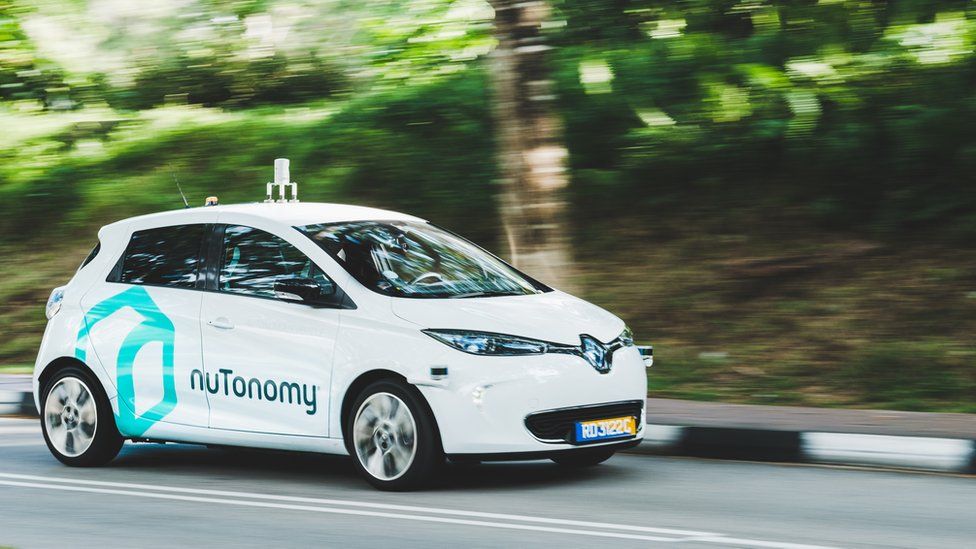Self-driving taxi trial kicks off in Singapore
- Published

Self-driving cars and taxis are the buzz of the industry. Everyone seems to be doing it, trying grab headlines with every step forward or new trial phase.
But the real deal always seemed to be still years in the future.
Now, here in Singapore, you can in fact hop into a driverless taxi and go for a ride. And it's even free.
But hold your horses, it's still only a trial. It does, though, take things a wee bit further than what we've seen from the big car makers, Google or ride-hailing giant Uber.
WATCH: Driverless taxis roam Singapore streets
A truly driverless ride?
Well, sort of. Given that it is a trial, there's of course still a driver in the front.
But the cars are doing the driving themselves, and the driver is only there to monitor the performance and as a backup in case something goes wrong.
Who's behind it?
It is not any of the big names of the car industry who we know are all pushing the technology in their research and development departments.
It's a company called nuTonomy, a US-based start-up developer of software for self-driving cars. The company was founded in 2013 by two MIT researchers specializing in robotics and driverless technology. The firm has offices both in the US and in Singapore.
Earlier this year, nuTonomy was the first company to get permission from the Singapore government to test self-driving cars in a small area of the town. It's now begun tests with passengers.
How does it work?
Given that nuTonomy is not a car manufacturer, these are not flashy futuristic vehicles designed for a driverless future. Rather, they are small Renault and Mitsubishi electric vehicles that have been equipped with the company's software and cameras.
The micro cars are still, however, a step up from some of nuTonomy's previous trials with driverless vehicles in 2014 - back then, the flashy ride was in fact an electric golf cart.
The new taxi trial currently consists of a fleet of six cars - each of them has a complex system of lasers that operate like a radar to monitor the car's surrounding. In addition there are cameras that work with the software.
Free rides across Singapore?
Not exactly. It's a very, very small part of town and far, far away from the centre. The taxis will run in a limited 2.6 sq mile (4 sq km) area in the west of the city-state. Also, there are designated pick-up and drop-off spots so you can't get on or off wherever you fancy.
And it's not for everyone yet. You have to register after receiving an invitation from nuTonomy and so far, only a few dozen people are part of the programme. The firm says that it plans to expand the service to thousands of people within a few months.
Why Singapore?
The city is already a bit of a taxi heaven. Owning your own car is mind-bogglingly expensive and many people take taxis on a regular basis. Cab rides are cheap and there's a very high demand.
Also, the city's overall traffic situation is rather disciplined and organised. More often than not when Singaporeans talks about a traffic jam, all they mean are a few cars more than usual at a traffic light.
So the goal is not just to complete a little trial but to expand it to a fully self-driving taxi fleet in Singapore by 2018 - that's according to nuTonomy.
Way ahead of the competition?
NuTonomy appears to be amongst the top of the pack, but is by no means way ahead of the other players.
Uber is planning a very similar project to be launched in Pittsburgh in the US in a few weeks time.
And just about every car company is working on driverless technology from Silicon Valley's Tesla to Ford, Volvo, BMW and a number of Chinese car makers.
Internet giant Google was in fact amongst the first to pioneer and extensively test its driverless Google car and has teamed up with a number of car makers for their research.
- Published18 August 2016
- Published16 May 2016
- Published1 February 2016